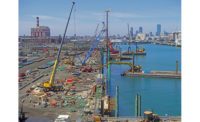Deck Rehabilitation and Joint Modifications to Bridge on I-95 South of the Fort McHenry Tunnel
Baltimore
Best Project
Owner Maryland Transportation Authority
Lead Design Firm Wallace Montgomery
General Contractor Wagman Heavy Civil Inc.
Civil Engineer Wallace Montgomery
Architectural/Engineering Design (Construction Inspection) Johnson, Mirmiran & Thompson Inc.
Engineering Consulting (Construction Inspection) WSP | Parsons Brinckerhoff
The Interstate-95 Deck Rehabilitation and Joint Modification Project in Baltimore was the nation’s largest latex modified concrete overlay rehabilitation project awarded as a single contract, according to contractor Wagman Heavy Civil.
The $54.5-million project for the Maryland Transportation Authority (MDTA) involved repairing more than 236,000 sq yd of existing bridge decks. Wagman self-performed the concrete work, furnishing and installing the latex modified concrete (LMC). The LMC overlay and expansion-joint modifications on 28 bridges followed deck rehabilitations that used hydro demolition on I-95 between I-695 and the Fort McHenry Tunnel.
Considering the size of the LMC project, the biggest risk to MDTA was getting the quality it expected for the latex modified concrete, including the material and workmanship associated with preparing and placing the overlay. When properly installed, LMC is estimated to increase the service life of the bridge deck by more than 20 years.
Wagman’s turnkey operation allowed it to procure materials, calibrate and test mobile mixer trucks and equipment, and also have total oversight during the overlay process.
The project’s scale and schedule forced the project team to be creative. Floating rail along parapets eliminated the need for gutter deck pours, removing an unnecessary phase joint and gaining time in the schedule. In work areas that required expansion-joint replacement, the project specified a 12-hour concrete mix from a ready-mix plant, which threatened to have a negative impact on the schedule. Wagman developed and worked with MDTA to receive approval for a rapid-hardening concrete mix that could be internally produced and cured within four hours.
Hundreds of additional repairs were incorporated into the project, many of which will go unseen by the general public; these efforts, however, are expected to help avoid the need to return to these bridges for repairs for years to come, according to the project team. The additional work included replacing broken and leaking roadway joints, installing drainage troughs below joints and completing fatigue retrofits to minimize the potential for cracking of the bridge superstructures.
Wagman’s self-performed work represented nearly 50% of the contract value. The contract also required a 26% minority business enterprise goal and a 2% Veterans Small Business Enterprise goal. Wagman engaged 27 small minority-owned or disadvantaged business firms for the contract.
The project was completed on time and on budget, earning Wagman a substantial completion milestone incentive.






Post a comment to this article
Report Abusive Comment